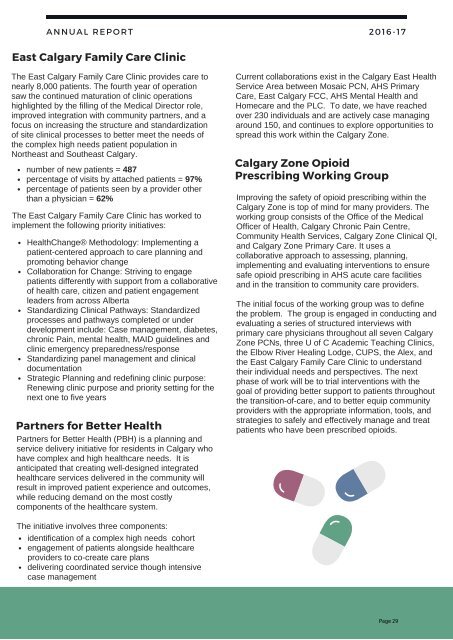DFM 2016-2017 Annual Report
2016-2017 Annual Report from the Department of Family Medicine, Calgary.
2016-2017 Annual Report from the Department of Family Medicine, Calgary.
- No tags were found...
You also want an ePaper? Increase the reach of your titles
YUMPU automatically turns print PDFs into web optimized ePapers that Google loves.
A N N U A L R E P O R T 2 0 1 6 - 1 7<br />
East Calgary Family Care Clinic<br />
The East Calgary Family Care Clinic provides care to<br />
nearly 8,000 patients. The fourth year of operation<br />
saw the continued maturation of clinic operations<br />
highlighted by the filling of the Medical Director role,<br />
improved integration with community partners, and a<br />
focus on increasing the structure and standardization<br />
of site clinical processes to better meet the needs of<br />
the complex high needs patient population in<br />
Northeast and Southeast Calgary.<br />
number of new patients = 487<br />
percentage of visits by attached patients = 97%<br />
percentage of patients seen by a provider other<br />
than a physician = 62%<br />
The East Calgary Family Care Clinic has worked to<br />
implement the following priority initiatives:<br />
HealthChange® Methodology: Implementing a<br />
patient-centered approach to care planning and<br />
promoting behavior change<br />
Collaboration for Change: Striving to engage<br />
patients differently with support from a collaborative<br />
of health care, citizen and patient engagement<br />
leaders from across Alberta<br />
Standardizing Clinical Pathways: Standardized<br />
processes and pathways completed or under<br />
development include: Case management, diabetes,<br />
chronic Pain, mental health, MAID guidelines and<br />
clinic emergency preparedness/response<br />
Standardizing panel management and clinical<br />
documentation<br />
Strategic Planning and redefining clinic purpose:<br />
Renewing clinic purpose and priority setting for the<br />
next one to five years<br />
Partners for Better Health<br />
Partners for Better Health (PBH) is a planning and<br />
service delivery initiative for residents in Calgary who<br />
have complex and high healthcare needs. It is<br />
anticipated that creating well-designed integrated<br />
healthcare services delivered in the community will<br />
result in improved patient experience and outcomes,<br />
while reducing demand on the most costly<br />
components of the healthcare system.<br />
Current collaborations exist in the Calgary East Health<br />
Service Area between Mosaic PCN, AHS Primary<br />
Care, East Calgary FCC, AHS Mental Health and<br />
Homecare and the PLC. To date, we have reached<br />
over 230 individuals and are actively case managing<br />
around 150, and continues to explore opportunities to<br />
spread this work within the Calgary Zone.<br />
Zone Opioid<br />
Calgary<br />
Working Group<br />
Prescribing<br />
Improving the safety of opioid prescribing within the<br />
Calgary Zone is top of mind for many providers. The<br />
working group consists of the Office of the Medical<br />
Officer of Health, Calgary Chronic Pain Centre,<br />
Community Health Services, Calgary Zone Clinical QI,<br />
and Calgary Zone Primary Care. It uses a<br />
collaborative approach to assessing, planning,<br />
implementing and evaluating interventions to ensure<br />
safe opioid prescribing in AHS acute care facilities<br />
and in the transition to community care providers.<br />
The initial focus of the working group was to define<br />
the problem. The group is engaged in conducting and<br />
evaluating a series of structured interviews with<br />
primary care physicians throughout all seven Calgary<br />
Zone PCNs, three U of C Academic Teaching Clinics,<br />
the Elbow River Healing Lodge, CUPS, the Alex, and<br />
the East Calgary Family Care Clinic to understand<br />
their individual needs and perspectives. The next<br />
phase of work will be to trial interventions with the<br />
goal of providing better support to patients throughout<br />
the transition-of-care, and to better equip community<br />
providers with the appropriate information, tools, and<br />
strategies to safely and effectively manage and treat<br />
patients who have been prescribed opioids.<br />
The initiative involves three components:<br />
identification of a complex high needs cohort<br />
engagement of patients alongside healthcare<br />
providers to co-create care plans<br />
delivering coordinated service though intensive<br />
case management<br />
Page 29


